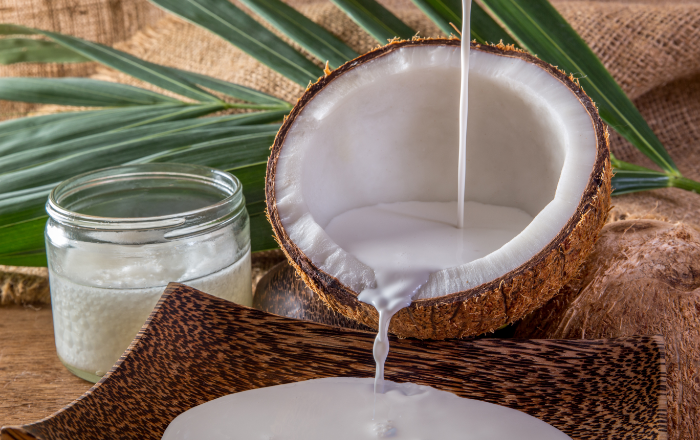Choosing between coconut oil and extra virgin olive oil often depends on the specific use, taste preferences, and health considerations.
Both oils have distinct characteristics, and their suitability as substitutes can vary based on the intended application.
Flavor Profile
One of the primary differences between coconut oil and extra virgin olive oil is their flavor profiles. Extra virgin olive oil has a rich, fruity flavor with a slightly peppery finish. It is commonly used in Mediterranean cuisine and is celebrated for its robust taste.
On the other hand, coconut oil has a distinct tropical flavor and aroma, making it a popular choice in dishes where a coconut taste is desired.
If you’re looking for a substitute that maintains the specific flavor of one of these oils, consider your recipe’s requirements. Coconut oil might be a good substitute if you’re aiming for a coconut undertone, while extra virgin olive oil can be used for its characteristic Mediterranean flavor.
Cooking Temperature
Another crucial factor is the cooking temperature. Both oils have different smoke points, which is the temperature at which an oil starts to break down and produce smoke. Extra virgin olive oil has a lower smoke point compared to refined olive oil, and it may not be suitable for high-heat cooking methods like deep frying.
Coconut oil, particularly refined coconut oil, has a higher smoke point, making it more suitable for frying and sautéing at higher temperatures.
If your recipe involves high-heat cooking, coconut oil might be a better substitute to prevent the oil from reaching its smoke point and developing an undesirable taste. However, the flavor of coconut is unique and not desirable to some people.
On the other hand, refined (or pure) olive oil rivals the smoke point of coconut oil and has no flavor has none of the health benefits of extra virgin olive oil.
Nutritional Content
Nutritional considerations also play a role in choosing between these oils. Extra virgin olive oil is renowned for its heart-healthy monounsaturated fats and antioxidants. It is a staple in the Mediterranean diet, which has well known health benefits.
Coconut oil, on the other hand, contains a higher proportion of saturated (unhealthy) fats. While there has been some debate about the health implications of saturated fats, moderation is key. If you are health-conscious, you may want to consider the nutritional content of each oil and choose accordingly.
Solid vs. Liquid State
Coconut oil is solid at room temperature, while olive oil remains liquid. This physical difference can impact the texture of certain recipes. If a recipe calls for a liquid oil, extra virgin olive oil may be a better substitute.
On the contrary, if a solid fat is needed, especially for baking or creating specific textures, coconut oil might be the better choice. Follow your recipe but consider the flavor that coconut oil imparts into dishes.
Consideration for Specific Dishes
When substituting one oil for another, consider the specific requirements of your dish. For example:
- Baking: Coconut oil can be a good substitute in baking recipes, especially those with tropical or coconut-based flavors. It can add a unique twist to cookies, cakes, and muffins.
- Sauteing and Frying: Coconut oil’s higher smoke point makes it suitable for sautéing and frying, providing a slightly sweet and nutty (coconut) flavor to the dish.
- Salad Dressings: Extra virgin olive oil is a classic choice for salad dressings, contributing to the overall taste with its rich and fruity notes and history of creating excellent salad dressings.
Whether coconut oil is a good substitute for extra virgin olive oil depends on the specific requirements of your recipe. Consider factors such as flavor, cooking temperature, nutritional content, and the physical state of the oil.
Both oils have their unique characteristics and can be excellent choices based on the desired outcome. Experimenting in the kitchen and understanding the flavor profiles of these oils will help you make informed decisions when substituting one for the other in your recipes. Always consider your specific allergies and health conditions before trying any new cooking oil.
Please consult with a licensed healthcare professional before making any changes to your diet.
Please leave comments, questions or suggestions below.
Tom – Olive Oil Lover


